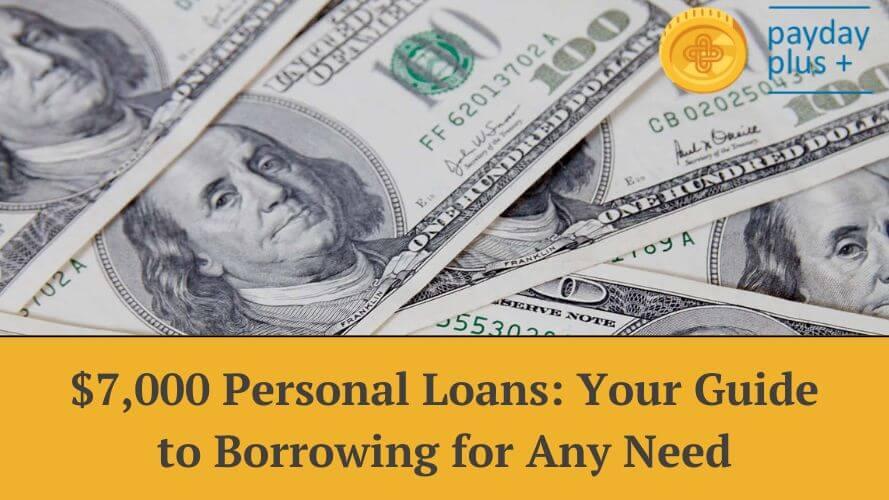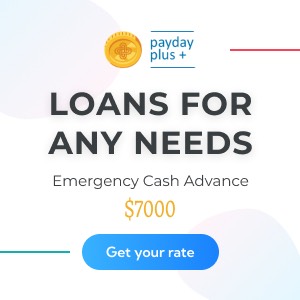
A $7,000 personal loan can help you cover unexpected expenses, finance a home improvement project, consolidate debt, or fund a major purchase. Whether you have good credit or bad credit, personal loans of $7,000 are available from a variety of lenders, and understanding your options can help you make a smarter borrowing decision.
How to Apply for a $7,000 Loan
Securing a $7,000 personal loan is a straightforward process when you know the steps. Start by assessing your credit situation and calculating what you can afford to pay back each month. From there, research lenders that offer personal loans and compare the terms, interest rates, and fees. Many online platforms allow you to get personalized loan offers without affecting your credit score, simplifying the process.
Once you've chosen a lender, the application process usually involves filling out an online form with basic personal information, financial details, and documentation like proof of income and identity. If you're approved, the loan amount will be deposited into your bank account, often within a few business days.
Ad
Where to Get a $7,000 Personal Loan
You can apply for a $7,000 personal loan from banks, credit unions, or online lenders. Banks and credit unions may offer competitive rates, especially for existing customers, but the process can take longer than applying through an online lender. Online lenders typically offer faster approval times and are more flexible, often working with borrowers of all credit types.
Acorn Finance, for example, allows you to compare multiple $7,000 loan offers from trusted lenders and get matched to the best loan for your situation, all within minutes.
What Are the Eligibility Requirements for a $7,000 Loan?
To qualify for a $7,000 loan, you will typically need to meet certain criteria. Most lenders require borrowers to have a credit score of at least 600, though those with higher scores will likely get better rates. Additionally, lenders will review your debt-to-income (DTI) ratio, proof of income, and sometimes your employment status. Be prepared to submit documents like your W-2s, pay stubs, or tax returns to verify your eligibility.
How to Increase Your Chances of Approval for a $7,000 Loan
Boosting your chances of getting approved for a $7,000 personal loan involves improving your credit score and lowering your DTI ratio. Paying down existing debts and increasing your income can help make you a more attractive candidate to lenders. You may also consider applying with a co-signer, which can lower the lender's risk and increase your chances of approval.
Ad
What Is the Monthly Payment for a $7,000 Personal Loan?
The monthly payment for a $7,000 loan depends on several factors, including the loan term and your credit score. For instance, if you have excellent credit, you may qualify for a monthly payment between $617 and $646 for a loan term of 12 to 36 months. If your credit is less than perfect, payments could be higher, ranging from $661 to $665 per month for the same loan amount and term. You can use loan calculators to estimate how much your monthly payments will be based on the specific terms you qualify for.
How Fast Can You Get a $7,000 Loan?
Many lenders offer fast approval and funding for $7,000 personal loans, especially online lenders. Once you apply, you may receive approval within hours or a few business days, and your funds could be deposited into your account the same day or within 24 hours, depending on the lender and your bank’s policies.
Can You Get a Loan for $7,000 With Bad Credit?
While it’s more difficult to secure a $7,000 loan with bad credit, it is possible. Lenders like Upstart and OneMain Financial are known for working with borrowers who have less-than-perfect credit. However, bad credit loans often come with higher interest rates and stricter terms. To increase your chances of approval, consider applying for a secured loan, which requires collateral, or seek a co-signer with a stronger credit profile.
Ad
How Much Does a $7,000 Loan Cost?
The cost of a $7,000 personal loan is influenced by the interest rate, loan term, and any additional fees. On average, interest rates for a $7,000 loan range from 6% to 36%. The best rates are typically available to borrowers with excellent credit, while those with poor credit may face higher interest rates. Some lenders also charge origination fees, which can add up to 10% of the loan amount, and there may be penalties for early repayment.
$7,000 Instant Cash Loan Apps
For those in need of fast cash, certain apps offer quick access to $7,000 loans. These apps allow you to apply for loans directly from your smartphone, with fast approval processes and flexible terms. While these apps are ideal for emergencies, it's important to understand the fees and interest rates before accepting an offer. Some of these loan apps provide instant approval and same-day funding, making them a convenient option for urgent financial needs.
5 Tips to Get a Lower Rate on Your Loan
- Improve your credit score: Work on improving your credit by paying bills on time and reducing credit card balances to qualify for better rates.
- Consider a co-signer: Having a co-signer with good credit can help you secure a lower interest rate.
- Opt for a shorter loan term: A shorter repayment term can save you money on interest, though your monthly payments will be higher.
- Shop around: Compare multiple lenders to find the best rates and terms for your $7,000 loan.
- Get a secured loan: Using collateral for your loan can lower the interest rate and increase your chances of approval.
How to Pay Off $7,000 in Debt
To pay off a $7,000 loan faster or save on interest, consider refinancing if interest rates drop. You can also make extra payments to reduce the principal balance or try payment splitting to ease your monthly budget without incurring extra fees.
Alternatives to Personal Loans
Before applying for a $7,000 personal loan, consider alternatives like peer-to-peer lending, 0% APR credit cards, or home equity loans. Peer-to-peer lending connects you directly with investors, potentially offering more flexible terms, while a 0% APR credit card could provide interest-free borrowing if paid off within the introductory period.
Ad
